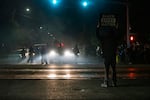
A new statewide poll shows skepticism about the impact of racial justice protests in Portland.
Jonathan Levinson / OPB
Oregon voters have soured on the protests in Portland against systemic racism and police brutality, with majorities saying they are mostly violent and are not achieving positive results, according to a survey conducted by a Portland research firm.
The Sept. 3-8 online poll of 502 voters from around the state found that 66% said they disapproved of the ongoing protests in Oregon’s largest city when asked.
The survey came just days after the fatal shooting in downtown Portland of a man connected to the right-wing Patriot Prayer group. It also followed more than three months of nightly protests that have often ended in with a small subset of demonstrators starting fires or other vandalism and Portland officers using tear gas and other crowd dispersal weapons.
“Most Oregonians do not believe the protests have been helpful to Black Portlanders, to race relations or to efforts to make police reforms,” said John Horvick of DHM Research, which conducted the independent survey. The poll has a margin of error of 4.4 percentage points, plus or minus, and included voters from throughout the state.
Horvick added that “something’s changed in the public’s minds about the events that have been happening in Portland” since a Black man, George Floyd was killed by police in Minneapolis on May 25. Since the demonstrations began in Portland, there have been numerous marches and rallies supporting the Black Lives Matter movement that have been peaceful. However, nightly demonstrations in a few locations have often produced broadly watched footage of clashes between police and demonstrators that have often included tear gas, property destruction and vandalism.
DHM Research also conducted a poll in late July that found a more mixed view of the protests. That survey showed that 27% of people surveyed regarded them as peaceful, another 19% found them violent and half saw elements of both. Voters then were closely divided about whether the demonstrations would produce meaningful reforms. Thirty-one percent thought they would, 31% thought they would not and 38% were unsure.
The more negative voter view of the protests – which includes 55% of respondents specifically saying that they should be labeled as riots rather than protests – came as demonstrations in Portland and around the country have featured heavily in the presidential campaign. President Donald Trump has condemned Portland Mayor Ted Wheeler and Gov. Kate Brown for their handling of the protests and said the National Guard should be called in to quell them.
Democratic nominee and former Vice President Joe Biden made it clear that he supports peaceful protests but believes demonstrators who break the law should be arrested and prosecuted. Brown last week issued a statement jointly signed by numerous fellow Democratic officeholders and many civic groups that “condemn the acts of violence in Portland that have occurred as thousands of Oregonians have been peacefully protesting for racial justice and police accountability.”
At the same time, poll respondents were bipartisan in their condemnation of how Trump, Brown and Wheeler have handled the protests. They heaped the most scorn on Trump, a Republican who lost Oregon handily in the 2016 election and has never been popular in the state. All told, 59% disapproved of how the president dealt with the protests, with 51% saying they strongly rejected his actions. The Trump administration sent a large contingent of federal law enforcement officers into the state in July to guard the federal courthouse and other U.S. government facilities in Portland, a move that wound up swelling the number of protesters instead of tamping demonstrations down.
Meanwhile, 58% disapproved of Wheeler’s performance and 56% gave negative marks to Brown. However, in each case, the percentage of those who strongly opposed the governor’s and mayor’s actions were noticeably lower than for Trump. Wheeler and Brown are both Democrats.
Voters were more divided about the role of the police, with 46% saying they approved of the way the city’s officers are handling the protests while 45% disapproved. Twenty-nine percent said the police used too much force, 18% said it was about right and 42% said they didn’t use enough.
The poll also found sharp generational differences among voters, with 66% of those aged 18 to 29 believing police are using too much force. A strong majority of that age group also approved of the protests generally. A majority of voters in the Portland area disagreed with the protests in Oregon’s largest city, but by a somewhat smaller percentage than voters in the rest of the state.
Bobbin Singh, executive director of the Oregon Justice Resource Center, said he wasn’t surprised by the poll, given all the “distortion and noise and confusion about what is happening” at the protests. And he noted such now-revered leaders such as Martin Luther King were often not popular during the civil rights movement of the 1950s and 1960s.
“When you challenge the system, that’s often the response you get,” said Singh, whose group was one of several that recently called for Wheeler’s resignation. He said the protests continue to garner results, such as Wheeler’s decision to put three officers on administrative duty while complaints about alleged misconduct are investigated.
Rep. Ron Noble, R-McMinnville, also said he wasn’t surprised by the results of the poll. Noble, a former McMinnville police chief, said the initial protests helped lead the Legislature to pass several police reform bills he supported. But that drive for reform been overshadowed by the criminal activity at the events, he said.
“It’s not about racial equity,” Noble said. “In fact that message has been co-opted, to where it’s really more anarchy.”